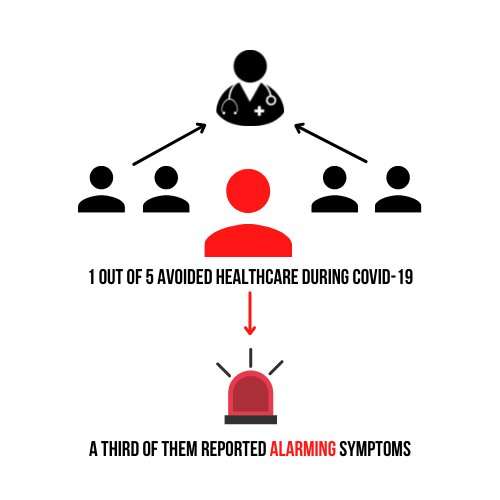A new population-based study among individuals aged 40 years and older reveals the extent of healthcare avoidance during the COVID-19 pandemic. Created with Canva. Credit: Marije Splinter, CC BY 4.0 (creativecommons.org/licenses/by/4.0/)
One in five individuals avoided healthcare during lockdown in the COVID-19 pandemic, often for potentially urgent symptoms, according to a new study publishing November 23rd in PLOS Medicine by Silvan Licher of Erasmus University Medical Center Rotterdam, the Netherlands, and colleagues.
During the COVID-19 pandemic, consultations in both primary and specialist care declined compared to pre-pandemic levels. It is unclear to what extent healthcare avoidance by the general population contributed to these declines. In the new study, researchers sent out a paper questionnaire to 8,732 participants of the Rotterdam Study, a cohort study designed to investigate chronic diseases in mid to late-life, covering several COVID-19 related topics, including healthcare avoidance. 73% of participants responded between April and July 2020 and the final population for the study was 5,656 individuals residing in the same district in Rotterdam, the Netherlands.
About one in five (20.2%) of participants reported having avoided healthcare during the pandemic. Of those, 414 participants (36.3% of avoiders) reported symptoms that potentially warranted urgent medical attention, including limb weakness (13.6%), palpitations (10.8%) and chest pain (10.2%). However, there was no data available on the severity of symptoms. Groups most likely to have avoided healthcare included females (adjusted odds ratio (OR) 1.58, 95% confidence interval (CI) 1.38-1.82), those with poor self-appreciated health (per level decrease 2.00, 95% CI 1.80‑2.22), and those with high levels of depression (per point increase 1.13, 95% CI 1.11-1.14) and anxiety (per point increase 1.16, 95% CI 1.14-1.18). Lower educational level, older age, unemployment, smoking and concern about contracting COVID-19 were also associated with healthcare avoidance.
"Findings of our study suggest that healthcare avoidance during COVID-19 may be prevalent amongst those who are in greater need of it in the population, such as older individuals, those with low perceived health and those who report symptoms of poor mental health," the authors say. "These findings call for population-wide campaigns urging individuals who are most prone to avoid healthcare to reach out to their primary care physician or medical specialist to report both alarming and seemingly insignificant symptoms."
"One in five avoided healthcare during COVID-19 lockdown, often with alarming symptoms like chest pain or limb weakness," Licher adds. "Vulnerable citizens were mainly affected, emphasizing the urgent need for targeted public education."
More information: Splinter MJ, Velek P, Ikram MK, Kieboom BCT, Peeters RP, Bindels PJE, et al. (2021) Prevalence and determinants of healthcare avoidance during the COVID-19 pandemic: A population-based cross-sectional study. PLoS Med 18(11): e1003854. doi.org/10.1371/journal.pmed.1003854
Journal information: PLoS Medicine
Provided by Public Library of Science
























